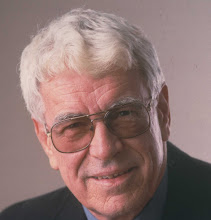“Thanks to global warming, the Arctic icecap is rapidly melting, opening up access to massive natural resources and creating shipping shortcuts that could save billions of dollars a year. But there are currently no clear rules governing this economically and strategically vital region. Unless Washington leads the way towards a multilateral diplomatic solution, the Arctic could descend into armed conflict.”
That's the summary of a recent paper in Foreign Affairs, published by the US Council on Foreign Relations. Written by retired US Coast Guard officer Scott Borgerson, it was sent to me by an American friend who wanted my opinion. That summary made me blink.
Borgerson argues that global warming means that the fabled Northwest Passage will soon be ice-free in summer and, with icebreakers, navigable year-round. The melt will continue even if we stop greenhouse gas emissions tomorrow. Furthermore, the Arctic is rich in resources. The Russian offshore alone may contain oil reserves twice as large as Saudi Arabia's.
Five nations border the Arctic – Russia, the US, Norway, Denmark and Canada. There is no established agreement about where Arctic boundaries lie, as witness our contretemps with Denmark over tiny Hans Island. Do we really care about that minute pile of rock? No – but we do care about the adjacent seabed resources.
No legal framework determines who owns such resources, because they were always thought inaccessible. But now the rush is on. Russia has claimed 460,000 square miles of Arctic waters, has taken to flying strategic bombers over the Arctic, and recently planted a Russian flag on the seabed at the North Pole.
And are the waters of the Arctic archipelago, including the Northwest Passage, international waters open to the shipping of all nations – or territorial waterways belonging to Canada? Canadians assume that Canada owns all that territory, including considerable parts of the ocean – but the US and the European Union disagree. The point is not academic. A navigable Northwest Passage would cut 2000 nautical miles off a voyage from Seattle to Rotterdam and would shave about $3.5 million from its cost. And hundreds of ice-class ships are coming into service.
Borgerson aims to wake up the US, which has never ratified the UN Convention on the Law of the Sea (UNCLOS), and thus cannot formally assert its Arctic rights. Worse, says Borgerson, although the US navy is larger than the world's next 17 navies combined, it has only one usable icebreaker. Russia has 18. Canada plans to build up to eight new icebreakers, and is installing a satellite surveillance system. If possession is nine-tenths of the law, the US is in trouble.
Overall, says Borgerson, “the combination of new shipping routes, trillions of dollars in possible oil and gas resources, and a poorly defined picture of state ownership makes a toxic brew.” The US should ratify UNCLOS, build icebreakers and strike a deal with Canada to create an Arctic seaway management commission comparable to the St. Lawrence Seaway Development Corporation. And it should lead the way to peace by convening a conference of Arctic nations to create “an overarching treaty that guarantees an orderly and collective approach to extracting the region's wealth.”
It all sounds good – but that's not how the US normally behaves. The notion that the US is needed to keep the peace between Canada and Denmark is deeply amusing, though the Russians are no joke. When it comes to national security and oil-supply issues, however, the US is generally the problem, not the solution. If the US wants unimpeded access to the Northwest Passage, it will declare that it is bringing peace and democracy to the Inuit, and it will send the navy, not the negotiators.
Borgerson's argument is a good one – but he's got the wrong country. Canada has the most to lose in the Arctic, and – as in the Cold War – it is sandwiched between the world's most formidable military powers. It would be folly for Canada – or Norway, or Denmark – to take up arms in the Arctic. Instead, Canada should combine with the Scandinavians to initiate a comprehensive Arctic treaty conference, inviting the Russians and the Americans to participate.
Canada could offer to internationalize the Northwest Passage and manage it collectively – in return for a declaration that the Arctic archipelago itself is Canadian. We should also note that nature may not consent to be managed, that the consequences of the Arctic melt are unpredictable, and that the Arctic nations should insist that any new cache of fossil fuels be rationed, not squandered. Our reckless use of fossil fuels got us into this mess. If the new resources will only get us in deeper, their rapid exploitation should be resisted.
The Arctic could be our last chance, as a species, to act with intelligence. Canada can play a key role. It's a rare opportunity. Let's seize it.
-- 30 --
Thursday, June 26, 2008
Guns along the Northwest Passage
Labels:
Arctic Ocean,
Borgerson,
Denmark,
Foreign Affairs,
Northwest Passage,
Norway,
oil,
Russia,
United States
Subscribe to:
Post Comments (Atom)

No comments:
Post a Comment